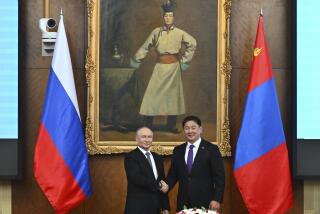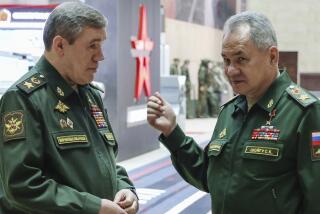Warrant Issued for Chechen Leader : Russia: Moscow accuses Dudayev of treason for armed resistance. Police search for him as offensive spreads westward.
- Share via
MOSCOW — Russia’s chief prosecutor issued a warrant Wednesday for the arrest of Dzhokar M. Dudayev, the president of Chechnya, on a treason charge growing from his separatist republic’s armed resistance to rule by Moscow.
The announcement said Russian police have begun a search for the former Soviet air force general, who apparently still leads the 7-week-old war from a secret, mobile headquarters. Until now, the Russians have not made any overt attempt to capture him.
A confidant of Dudayev said the Chechen leader viewed the warrant as a new attempt to discredit him and deflect appeals to the Kremlin from abroad to negotiate peace. The treason charge, one of four listed in the warrant, carries the death penalty.
The move against Dudayev came as Moscow’s forces spread their huge offensive westward to the border of the neighboring Russian republic of Ingushetia, whose people share the Chechens’ Muslim faith and largely support their independence struggle.
Samashki, a Chechen village on the border that had barely been touched by the war, suffered an overnight attack from three sides by Russian tanks, artillery and helicopters.
Reporters there said scores of houses collapsed or burned and at least 18 Chechens were killed.
Many of the village’s 15,000 residents and 5,000 war refugees fled to Ingushetia. Russian television reported that Chechen defenders killed 20 Russian soldiers and crippled seven armored personnel carriers.
Ingush Vice President Boris Agapov said every fourth person in his republic is a war refugee and “soon it will be every other person.” He warned that the spillover is raising tensions in the Caucasus Mountains region 1,000 miles south of Moscow.
Russian President Boris N. Yeltsin sent thousands of troops Dec. 11 to crush Chechnya’s independence bid.
The unexpectedly prolonged war has moved south and west from the shattered Chechen capital, Grozny, since Dudayev’s presidential palace and other positions north of the Sunzha River fell to Russian forces Jan. 19.
The Defense Ministry in Moscow said Wednesday that Russian troops now control bridges over the river and are edging into rebel-held neighborhoods on the other bank.
Dudayev fled the 10-story palace before a New Year’s assault on Grozny. He has since surfaced for several brief press conferences inside and outside Grozny, and periodically calls reporters on a mobile satellite phone.
In one interview, he said he was distraught over the deaths of his elder son, Alvur, a Chechen fighter, and thousands of other people in his tiny republic.
“My heart hurts when I think of people whom I have failed to defend,” he said.
His latest interview, with Russia’s Interfax news agency, set off tremors of insecurity in Russia and may have prompted the arrest warrant.
He warned that unless he is allowed to hold peace talks with Russia’s prime minister, terrorist supporters acting beyond his control could, within a month, take the war to Russian cities.
“It is no problem to burn towns,” Interfax quoted him as saying.
Russia’s government and news agencies interpreted the statement varyingly as evidence that Dudayev is a dangerous fanatic or that he does not control his fighters and is not worth negotiating with.
The charges brought against Dudayev by Prosecutor General Alexei Ilyushenko include calling for acts of terrorism, violating the rights of ethnic Russians in Chechnya and refusing to conduct a Russia-wide constitutional referendum in December, 1993.
The warrant accused Dudayev, who shoved aside a collapsing Soviet regime in 1991 and was later elected president of Chechnya by popular vote, of “premeditated actions to seize power, block the operation of its constitutional government bodies . . . and fan ethnic, social, religious enmity and discord in the republic.”
Diane Roazen, a University of Massachusetts professor who often speaks by phone to Dudayev from her Boston home, said the Chechen leader had anticipated the arrest warrant in a recent conversation.
“He said this was Moscow’s attempt to make sure the international community stops insisting on peaceful talks with him, a way to portray him as a criminal and cut him off from any sympathy abroad,” she said.
It is not clear how seriously the Russians are pursuing Dudayev.
His arrest could unleash the anti-Russian terrorism that he has often warned against and that his supporters say he is trying to restrain. In any case, most Russians and Chechens doubt that Dudayev’s capture would seriously demoralize the Chechen resistance.
After the warrant was issued, Moscow announced that Dudayev’s aides had asked Turkey to grant him political asylum but were turned down. The report could not be confirmed. Earlier, the president of Ingushetia denied harboring Dudayev.
Yeltsin, meanwhile, celebrated his 64th birthday without fanfare, still smarting from the political and economic damage inflicted by the offensive. The war has made a mockery of his wish expressed a year ago to a Russian newspaper: “I would like to celebrate my next birthday in a quieter and more prosperous Russia.”
The Defense Ministry announced Wednesday that Defense Minister Pavel S. Grachev had been hospitalized “for routine checks.”
More to Read
Sign up for Essential California
The most important California stories and recommendations in your inbox every morning.
You may occasionally receive promotional content from the Los Angeles Times.












